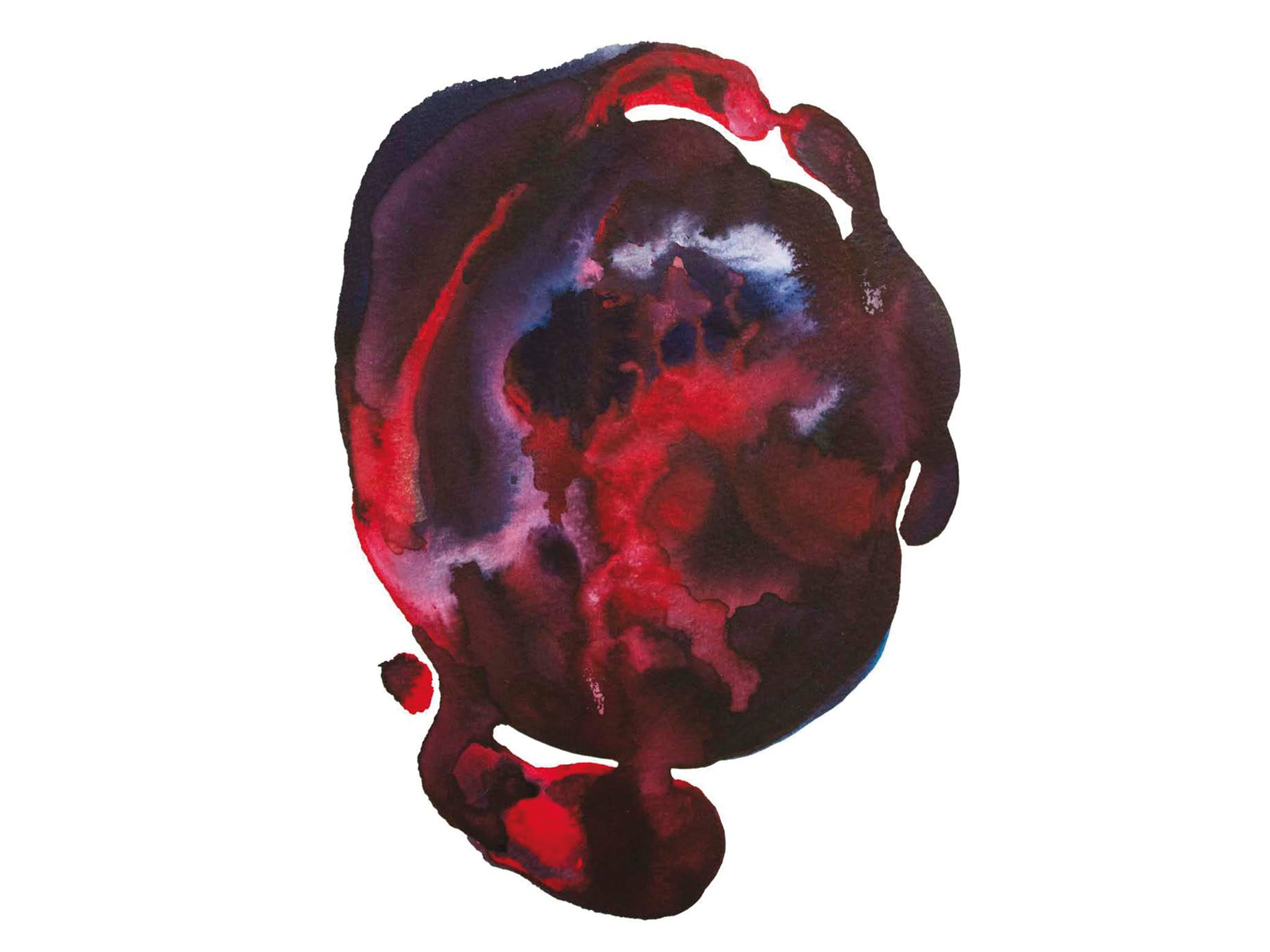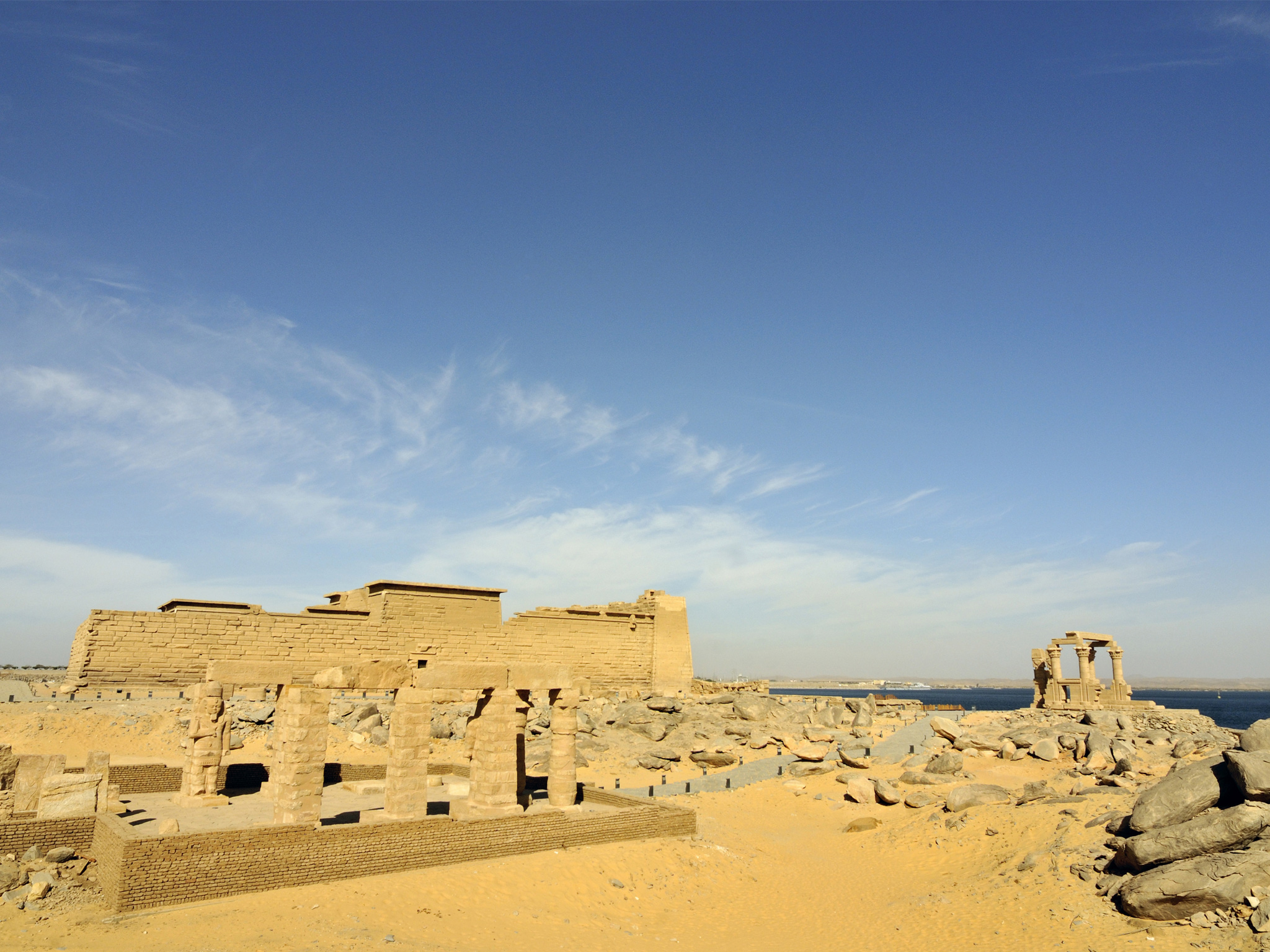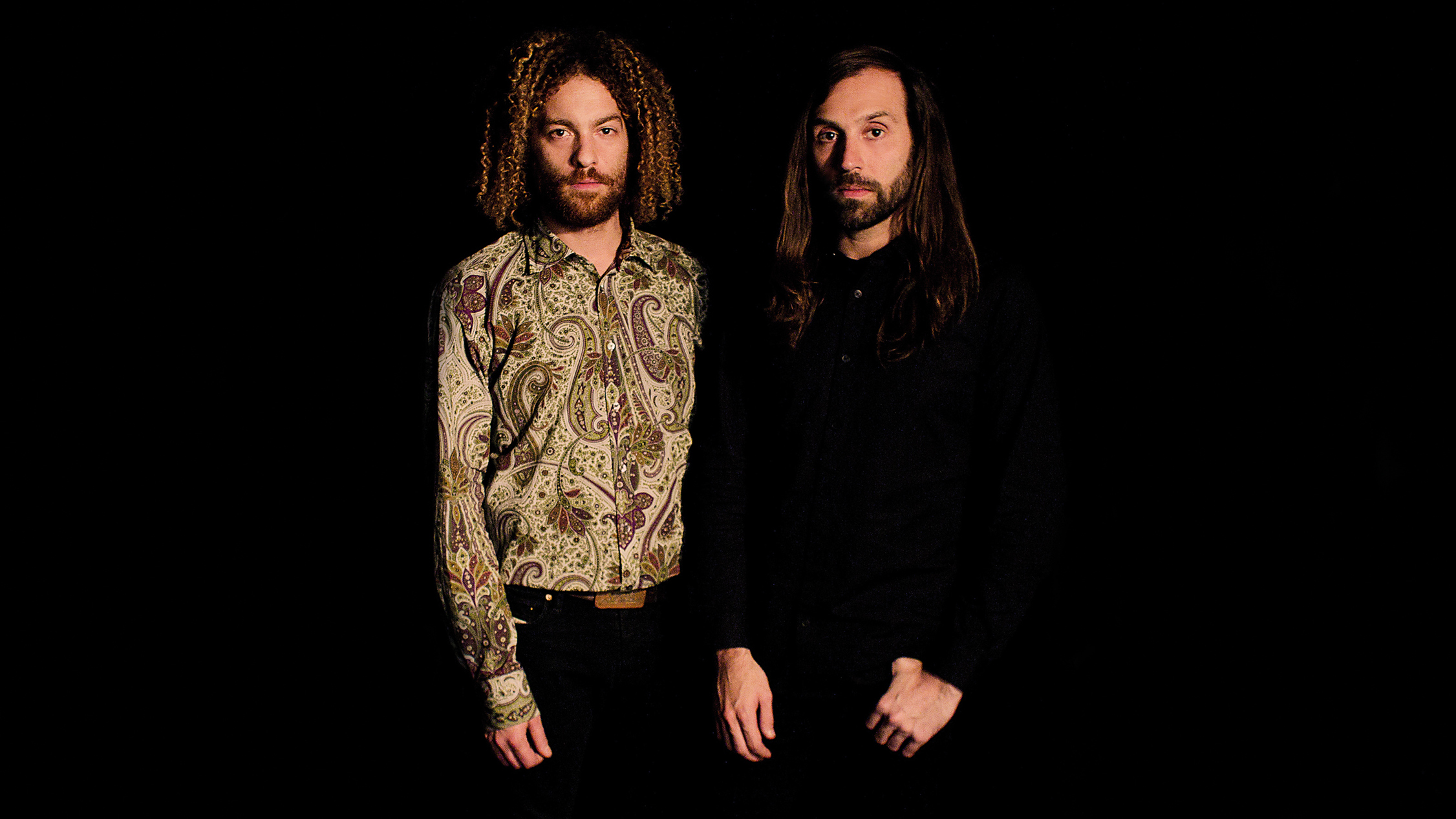On a leather sofa in a dimly-lit room in a recording studio somewhere on the outer reaches of North London sit two of the men behind one of the best British prog bands of the 21st century.
Right now, they couldn’t look more different. One sits in shadow, long jet black hair, clad head-to-toe in black, brow furrowed with intensity. The other, colourfully-shirted, open face topped by a mop of rust-coloured curls, perches at the opposite end of the sofa, haloed by the light from the upright lamp standing next to him.
If you’re looking for the perfect distillation of Messenger, this is it. Two distinct but opposing facets that together make a unique, intriguing whole. Earth and Air. Yin and yang. Light and dark.
“We’ve always been about that juxtaposition,” says guitarist and vocalist Khaled Lowe (ringlets, colourful shirt). “The darkness and the light that we get from the two of us. I’m a bit of a hippie. Ultra-positive all the time, a bit unrealistic.” He nods towards the other end of the sofa.
“He’s the Dark Lord – the Darth Vader of the studio.”
“I’m an intense kind of guy,” says drummer and producer Jaime Gomez Arellano (black hair, fierce stare). “I’m the one who screams at people to get things done.”
For a band who were never supposed to exist, Messenger are making a good go of things. Initially more of a vague sketch of an idea in the heads of Lowe and fellow guitarist/vocalist Barnaby Maddick (absent today) than an actual band, things only truly sprang to life when they hooked up with Arellano, who they had brought in as a producer (the latter has a successful parallel career behind the mixing desk, working with the likes of Anglo-Finnish folk-rockers Hexvessel and Swedish occult metallers Ghost; we’re speaking in the studio he owns).

Messenger’s debut album, 2014’s Illusory Blues, brought together pastoral folk, instrumental complexity and a Floydian otherness, bagging them a Limelight Prog Award, aka Best New Band, in the process. Two years later, follow-up Threnodies, doesn’t so much pick up where they left off as move things along several steps. Simultaneously heavier and more textured than its predecessor, it’s as dualistic as the men who made it.
They certainly make an unlikely pair on the surface. The 33-year-old Arellano was born and raised on a farm in Colombia; his mother, Beatriz Arellano, is a famous folk singer back home. When he wasn’t riding horses as a kid, he was listening to music. By the time he was 13, he was playing in local extreme metal bands.
You can discern the drummer’s Latin-American roots in Messenger’s music, if you know what you’re listening for. “Most of our stuff is in 6/8 and 3/4,” he says, referring to the band’s time signatures. “A lot of Andean and South American folk is in that – that’s waltz rhythm.” He admits that he’s fearsomely ambitious. Ask what inspires him outside of music, and he’s at a loss. “I’m usually working,” he says with a shrug.
By contrast, Khaled – also 33 – grew up in the leafy South London suburb of Richmond, the child of an English father and Egyptian mother. His North African heritage impacts subliminally on Messenger’s music. “I don’t have a particularly wide range of knowledge when it comes to North African and Middle Eastern music,” he says, “but we do tend to use a lot of those kind of scales in the band. I think it’s a subconscious thing.”
I still record on tape. It’s all mixed on analogue. I like that way of working. It has a human factor.
Lowe is, by his own admission, less ambitious and more laidback than Arellano. He credits his bandmate with lighting a fire under his arse. “Without, him I’d probably still be recording jams with tablas and thumb pianos,” he says. “Can I play them? [Laughing] No… but I can get sounds out of them.”
They admit they disagree on many things. Here they are on science and religion, for instance: Khaled: “I wouldn’t say any of us are religious, but spiritual? Yes, I’d say I am. There are gaps that science can’t quite fill in, but will one day.”
Jaime: “I’m very scientific person. I’m a massive Carl Sagan fan, Stephen Hawking, Isaac Asimov.”
Khaled: “The two of us have had arguments about the soul – whether it exists, what constitutes it, what happens to it when you die. That’s just one of the things we argue about.”
Jaime: “[Looking skeptical] Hmmm…”
Despite their differences, they followed similar paths to reach this point. As younger men, they both did their time in the world of extreme music. For Jaime, it was initially in local doom metal bands in Colombia, before graduating to the death and black metal underground when he moved to the UK aged 16 in 1999. For Khaled, it was the hardcore punk scene that hooked him. “It was people from all walks of life getting together in a room for this really brutal, violent music,” says the singer. “Even the way they danced was insanity, but through it all was this vehicle for positive change. That’s what attracted me – the positive outlook.”

The pair ultimately drifted away from their respective ghettoes. Arellano gravitated towards London’s art rock scene, hanging out with Kavus Torabi of Cardiacs and Knifeworld, and starting Mothlite with Daniel O’Sullivan; Lowe spent his time “noodling around” without any fixed plans, before teaming up with his bandmate four or five years ago.
“You discover more and more things, and get a bit weird and psychedelic,” says the singer of his musical journey. “Which is how we ended up here.”
If that makes it sound easy, it was. But it got harder around Threnodies. Their first album took six weeks to make. The new one took three months. A long time for a band who say they want to continually move forward.
It’s partly their own fault. They started work on Threnodies with next to no new material, figuring they could magic it all up in the studio. “I think I had a false sense of confidence,” says Lowe. “‘Hey, let’s just book into the studio and write, record and mix everything, get it all done, smashed!’” He shudders. “Never again.”
Working 16 hours a day for six days a week took its toll, in the shape of pressure-related stress (for everyone) and chronic insomnia (for Jaime). “I’m usually good with not sleeping loads, but I was getting really stressed out, worrying,” says the drummer. “And the flat next to mine was being redone.
I would go to sleep around three in the morning, and by seven or eight there guys would start hammering. There’s a technical side to my job, then there’s a very big part that is being creative. And the creative side gets affected.”
Arellano admits that he’s the one in the band most who most easily loses his temper. It comes, he says, with the territory of being producer, drummer and de facto manager.
“I’m a producer, that’s what I do for a living, and not just with this band,” he says, frowning. “Musicians are not very organised. They can be having too much fun. It’s great to have fun, but you have a deadline. I get stressed out when stuff’s not getting done. When people are just dicking around. That’s when I start screaming at people.”
And do you feel about being screamed at, Khaled?
“It depends,” says Khaled. “On occasion we want to murder each other. But you have to step back and think, ‘He’s saying this for a reason.’”
Even now, they seem unsure whether they like the record or not. “One thing we were worried about when we sat there listening to it was that all seven songs sound like seven different bands,” says Khaled, sounding like part of him is still worried.
It doesn’t, but it does sound like seven different facets of the same band. The muscular, amped-up Oracles Of War is the heaviest thing they’ve written; the Floydian reverie of Pareidolia is one of the most blissful. What Threnodies definitely is, is darker than its predecessor, musically and lyrically.
“We wanted to make a darker record,” says Lowe. “We like dark, melancholic music. It’s important for Messenger to have darkness and melancholy in what we do.
“There was a lot of craziness going on in our lives around the first album,” explains Lowe. “I don’t want to get too personal, but crazy relationships, people dying, bad circumstances. Things got really hairy. That album was the result of dealing with certain situations, using music cathartically. This time around the darkness in the lyrics came after we finished the music. This was standing and observing what’s going on around you. The album title – a threnody is a poem to the dead.”
So who died?
“There have been several people close to the band who have passed away,” he says, dodging specifics.
“And obviously us as musicians, we’re witnessing heroes of ours falling especially in the last couple of months. And then there are fallen ideologies, the idea of people getting along with each other. Instead of that we’ve got war and madness everywhere.”
That’s quite a pessimistic worldview.
“Yes and no,” says Lowe. “The whole nature of Messenger is a vehicle for self-improvement, for happiness. Yeah, on the first album there was that feeling of everything being really dark and miserable, but there was this light at the end of the tunnel. I think the same exists here if you look for it.”
This is where things get frustrating. While bands have no responsibility to explain what they’re singing about, Messenger aren’t letting out much at all. Where a song such as the amped-up, riff-heavy Oracles Of War (one of three songs featuring Barnaby Maddick on vocals) is fairly self-explanatory, ask after the meaning behind such elliptical song titles as Calyx and Balearic Blue, and the singer’s response is a kind of embarrassed wince: “I don’t really want to give away too much.”
OK. What about Pareidolia? That’s basically a term for seeing things that aren’t there, right?
“That song is about decisions that you make at a certain age,” he says, “and how your upbringing, or certain social, religious or family-based opinions and ideologies, can affect you, and how you can choose to take a stand against those ideologies and find yourself.” He trails off. “Y’know, I’d prefer it all to be allegorical.”
One thing they are happy to talk about is Messenger’s place in the scheme of things. They proudly see themselves as part of prog’s rich lineage, enthusing about playing on the same bill as Camel at a festival in Spain, or meeting Robert John Godfrey at the Prog Awards (Lowe is still kicking himself that he didn’t ask him about his reputed involvement in the Don Bradshaw-Leather album, an original copy of which he owns).
Similarly, Arellano takes pride in having recorded Threnodies (and Illusory Blues) on old school equipment. “I still record on tape,” he says. “It’s all mixed on analogue. I like that way of working. It has a human factor.” Of course, it all prompts the question of whether they’re living in the past, just replicating other people’s past glories.
“We don’t go out of our way to sound like anyone else,” says Lowe, looking more puzzled than offended. “I’ve had people compare my voice to everyone from Thom Yorke to a crapper Jeff Buckley, but musically we’re not anything like either of them. Barnaby, when he’s roaring, sounds like Jim Morrison, but we don’t sound anything like The Doors either.”
But is there a part of you that would rather it was, say, 1973 than 2016? Arellano pauses to think, then nods. “For some reasons, yes,” he says. “The world was a better place back then, for starters. And the world of music was so incredibly different to what it was now. Back then, you could sit there for hours and work out how to do something. Nowadays, you can buy a piece of software, press one key and you have something. You used to be able to separate the wheat from the chaff.”
“I very much prefer the old school way,” adds Lowe. “Musically and that feeling of, ‘We can change the world, man!’ But that belonged there, and as beautiful as it was, trying to recreate the past for fickle purposes is futile.”
At last, prog’s odd couple are in accordance. The yin and the yang made whole. The darkness and the light coming together.
Rocking the Cradle
“Playing in a 6000-year-old sacred burial site in Egypt? That would be amazing.”

As anyone who has seen Messenger live, the visual aspect of their show is as important as the musical aspect. This comes in a large part from Khaled Lowe, who works as film director and editor away from the band. During his career, he has worked with such disparate artists as British metal bands Bring Me The Horizon and Gallows, pop songbird Eliza Doolittle and hip hop star Professor Green.
For Lowe, who cites Italian horror maestro Dario Argento and French new wave pioneer Jean-Luc Goddard as cinematic influences, prog is the vehicle for the perfect marriage of sound and vision.
“One thing I’ve always enjoyed was the synthesis of music and live visuals,” he says. “The main thing that got me into that was watching the film of Pink Floyd live in Pompeii, which proved that a venue and a setting could be as important as the music. The two feed off each other – the music is quite spacey and ethereal, and its set against the fantastic backdrop. When the two are fused together, it’s out of this world.”
Lowe’s dream venue for a Messenger gig is even more grandiose. The last time the singer visited his mother’s family in Egypt, he went to Aswan, a town on the River Nile in the south of the country. “They have the Valley Of The Kings, the Valley Of The Queens, all of that,” he says. “There’s this place called the Kalabsha Temple. The idea of playing a concert in a 6000-year-old burial site, in a sacred temple, that would be amazing. To involve a visual show as well would be incredible.”

